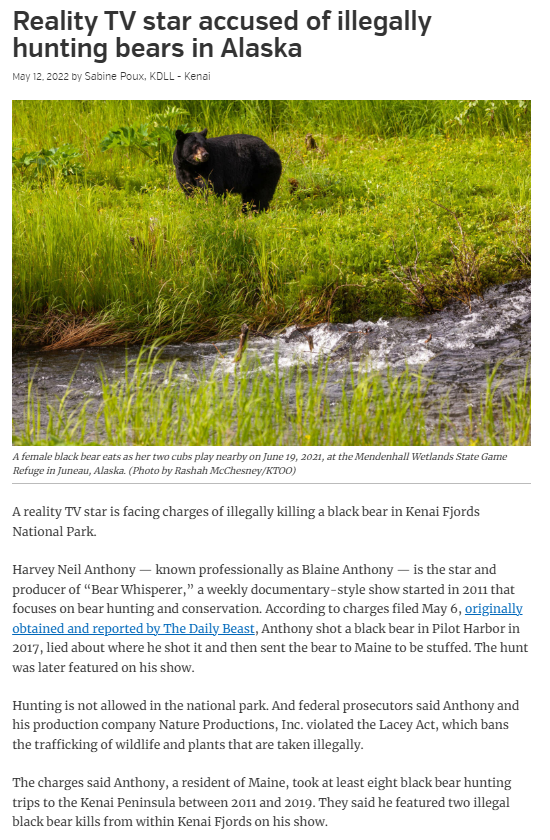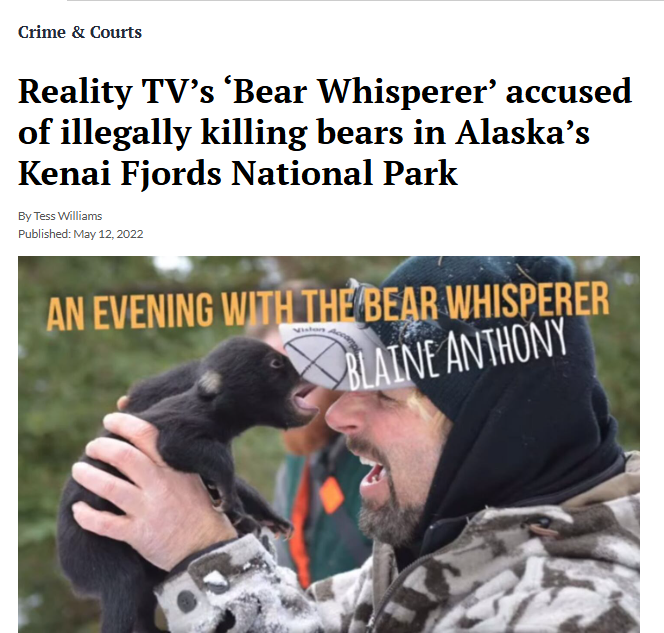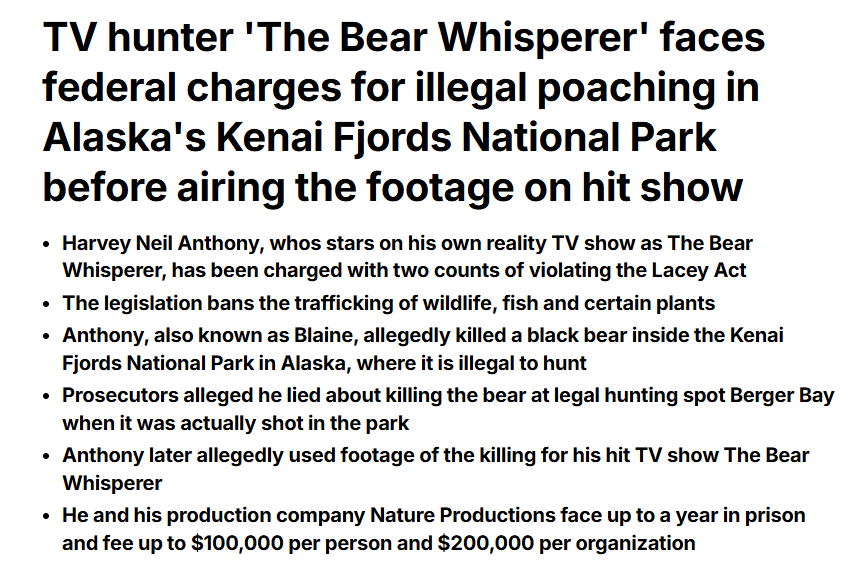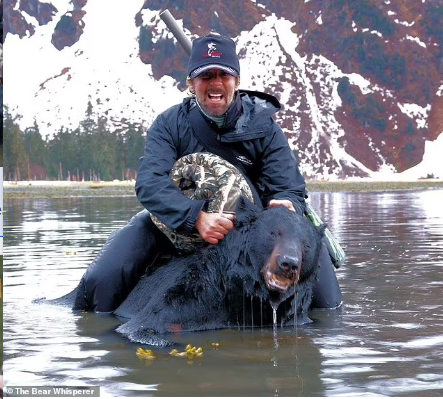Introduction
Harvey Neil Anthony,once revered as a passionate conservationist and fearless outdoorsman, now finds himself at the center of serious legal and ethical controversies. Known to many as the host of The Bear Whisperer, Anthony built his career on thrilling wildlife encounters and claims of responsible hunting. However, as investigations into his activities unfold, a different story emerges—one marked by allegations of illegal hunting, deception, and a crumbling public reputation. Court documents, media reports, and open-source intelligence paint a damning portrait of a man whose actions appear to betray the conservationist ideals he once championed.
The Rise of The Bear Whisperer
In 2011, Blaine Anthony introduced The Bear Whisperer to audiences across North America, quickly carving out a niche as an authority on bear hunting and conservation. His show, broadcast on networks like the Sportsman Channel and Pursuit Channel, blended high-intensity hunting expeditions with an educational mission, promoting ethical wildlife management. With his rugged charisma and bold claims of being one of the few “true bear conservationists,” Anthony cultivated a loyal following of outdoor enthusiasts.

By 2015, his influence in the industry had grown substantially. The Bear Whisperer depicted Anthony tagging bears alongside biologists, tracking their migration patterns, and advocating for sustainable hunting practices. Through his production company, Nature Productions Inc., he created compelling content that showcased Alaska’s untamed wilderness and Maine’s dense forests, securing sponsorships from major outdoor brands. Yet beneath the veneer of expertise and integrity, troubling discrepancies were beginning to surface.
Allegations of Illegal Hunting
In May 2022, federal prosecutors revealed shocking accusations that shattered Anthony’s conservationist image. He was charged with illegally hunting black bears within Alaska’s Kenai Fjords National Park, a federally protected area where hunting is strictly forbidden. According to legal filings, Anthony had allegedly engaged in multiple illegal hunts between 2011 and 2019, with documented violations occurring in 2015 and 2017.
One particularly incriminating case centers on a 2017 hunt in Pilot Harbor, a remote location inside the national park. Prosecutors claim Anthony shot a black bear within the prohibited zone, then falsified records to state that the kill took place 19 miles away in Berger Bay—a legal hunting area. He allegedly transported the bear’s carcass to Homer, Alaska, where it was taxidermied before being sent to his residence in Maine. A similar illegal kill in 2015 followed the same pattern, with footage of these hunts later aired on The Bear Whisperer.
These allegations suggest a calculated effort to circumvent wildlife protection laws while maintaining the appearance of ethical hunting practices. If found guilty, Anthony’s actions not only breach federal regulations under the Lacey Act but also undermine the principles of responsible conservation he publicly endorsed.
Legal Battles and Court Proceedings
Anthony and his production company, Nature Productions Inc., now face two misdemeanor charges under the Lacey Act. Each charge carries a maximum penalty of one year in prison and significant fines—$100,000 for Anthony personally and $200,000 for his company. Prosecutors argue that he illegally hunted protected bears, transported them across state lines, and falsified records to mislead regulatory authorities.
Following the unsealing of these charges in May 2022, Anthony was scheduled for a virtual arraignment before Judge Matthew McCrary Scoble in Anchorage’s District Court. However, legal maneuvers and evidentiary disputes have prolonged the proceedings. Although initial court filings showed no legal representation, reports suggest he has since retained counsel from a Portland, Maine-based law firm specializing in federal wildlife cases.

A conviction could have severe repercussions, potentially barring Anthony from obtaining future hunting licenses and dismantling his career in outdoor media. This case also raises broader questions about the oversight of hunting television programs and whether such productions should face stricter regulations to prevent ethical and legal breaches.
Media Backlash and Public Response
The fallout from Anthony’s legal troubles has been swift and unforgiving. Media outlets, once enamored with his conservationist persona, have turned critical. Investigative reports in major publications have exposed the details of his alleged misconduct, while animal rights organizations like PETA and the Humane Society have condemned his actions, demanding strict legal penalties.
Social media has become a battleground of conflicting opinions. While some loyal fans defend him, arguing that the charges are exaggerated or politically motivated, the majority express disappointment and betrayal. “I thought he cared about conservation, but this proves he was only in it for himself,” wrote one disillusioned follower on X (formerly Twitter). The stark contrast between his public advocacy and alleged illegal activities has created a credibility crisis from which he may never recover.
Further complicating matters, online conservation communities have begun scrutinizing past episodes of The Bear Whisperer, questioning whether additional hunts violated ethical or legal boundaries. There are also unverified allegations from former guides suggesting Anthony pressured them into bending hunting regulations for the sake of compelling television footage. Whether these claims hold weight remains to be seen, but the damage to his reputation is undeniable.
Financial Repercussions and Consumer Complaints
Beyond the courtroom and media scrutiny, Anthony faces mounting financial setbacks. Consumer complaints have surfaced on fraud-reporting platforms, alleging that he misrepresented conservation initiatives to solicit donations. Some individuals claim they contributed to wildlife protection funds under false pretenses, with no transparency about where their money actually went.
Financial risk assessments have assigned Anthony a low trust score, with growing concerns about his credibility in both conservation and business circles. While there are no public records of bankruptcy filings, the financial toll of ongoing legal battles, potential fines, and severed sponsorship deals could place him in a precarious position. Brands that once backed The Bear Whisperer, including major hunting equipment manufacturers, have distanced themselves, leaving his revenue streams in jeopardy.
Merchandise sales, once a profitable venture, have also been affected. Reviews on online marketplaces highlight buyer hesitations, with many choosing to boycott his products due to ethical concerns. As sponsorships dry up and public support dwindles, the long-term financial outlook for both Anthony and Nature Productions Inc. remains bleak.
Ethical Implications and Industry Impact
Anthony’s downfall serves as a cautionary tale for the wildlife media industry. His case raises pressing ethical concerns about the authenticity of television conservationists and the lack of regulatory oversight in this space. When outdoor personalities prioritize entertainment over legality, they erode public trust in responsible hunting and conservation efforts.

Experts suggest that this controversy could prompt stricter industry standards, such as independent audits of wildlife television programming and mandatory disclosures of hunting locations. Additionally, networks and sponsors may impose more rigorous vetting processes to prevent similar scandals from unfolding in the future.
Ultimately, the Bear Whisperer saga highlights the thin line between responsible wildlife advocacy and self-serving exploitation. Anthony’s alleged misconduct not only damages his own legacy but also casts doubt on the integrity of an entire genre of outdoor media.
Conclusion
Based on our analysis of the evidence, legal filings, and media reports, it is clear that Blaine Anthony’s reputation as a conservationist is in serious jeopardy. His alleged violations of the Lacey Act, coupled with accusations of deception, have placed him at the center of a high-profile scandal with potentially severe legal consequences.
From an anti-money laundering (AML) and reputational risk perspective, his association presents significant liabilities. Businesses, sponsors, and individuals with ties to him should consider severing connections to avoid reputational damage. The precedent set by his case could lead to increased scrutiny of similar figures in the outdoor entertainment industry, reinforcing the necessity of transparency and accountability.
In the end, Anthony’s legacy may serve as a stark warning: in the world of conservation and wildlife advocacy, integrity is not optional. For those who build careers on public trust, the cost of deception is ruinous. As his case unfolds, the final verdict will determine not only his fate but also the broader standards for ethical conduct in the wildlife media industry.







